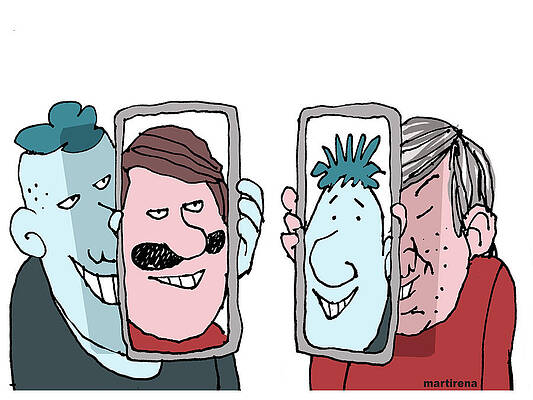
In todayŌĆÖs rapidly developing media society, personal identity constantly evolves as individuals navigate physical and digital spaces. Identity is shaped by interactions across various online platforms in the digital world, from social media to communities, where people express themselves through carefully curated profiles, avatars, and content. This digital environment provides a unique form of self-construction and expression, allowing individuals to share information about themselves that they may not be able to express easily in environments other than internet communities.
Users in the digital world can explore different aspects of their personality, constantly try out new images, and even create characters that may be completely different from their authentic selves. Digital space provides a safe environment for people who find it difficult to express themselves in real life, and individuals can break away from social prejudices related to appearance, race, or status. Internet interactions are similar to the interactions people sometimes have with ŌĆ£strangers on the train,ŌĆØ where a person opens up to a stranger sitting next to them and self-discloses intimate details that the person might never know to tell colleagues in the office or even family and friends at home. If(as on the internet instead of on the train) a person interacts further with the same person. This self-disclosure can quickly develop into a friendship, Rubin, Z. (1975).
Privacy is another key factor in constructing digital identity, as some personal information shared by criminals may be tracked, analyzed or even manipulated. Social media platforms and data-intensive applications continue to collect data, and identity theft and cyberbullying have also become prevalent risks.
Simon Leviev (real name Shimon Hayut) has received global attention for his alleged involvement in a series of romance scams detailed in the 2022 Netflix documentary Tinder Scams. Leviev reportedly posed as the son of Israeli diamond tycoon Levi Leviev, using dating apps such as Tinder to meet women across Europe, convincing his victims that he was facing threats from so-called “enemies” and needed substantial financial assistance. Under these pretexts, he convinced them to loan him large sums of money, which he promised to repay but instead used to fund his lavish lifestyle with other victims.These schemes lasted for several years, with some victims losing hundreds of thousands of dollars and leaving them with severe financial consequences. Leviev was eventually arrested in Greece on unrelated charges in 2019 and extradited to Israel, and he was arrested and sentenced to 15 months in prison. However, after just five months, he was released on good behaviour. After the release of the Netflix documentary, he used his fame to make money, selling videos to fans.
The potential safety risks of individuals on the Internet are still an unsolvable problem. As technology continues to develop, raising awareness, making self-judgments, and protecting personal information and property is necessary.

In the future, as global digitalization deepens, it is possible that people will need to seamlessly navigate between different realities for the sake of daily life and will need to embody different self-representations or avatars with different self-identities in virtual reality in addition to their original self-identification in the physical world, Chan, K.T. (2022). However, identity construction in the digital world is a complex and dynamic process that incorporates personal expression, social influence, and privacy issues. The online persona we create also challenges authenticity, causing many people to switch back and forth between their online ‘self’ and reality. We should continue to maintain the boundary between our digital selves and ourselves, Chan, K.T. (2022).
Reference List:
Bargh, J.A., McKenna, K.Y.A. and Fitzsimons, G.M. (2002). Can You See the Real Me? Activation and Expression of the ŌĆśTrue SelfŌĆÖ on the Internet. Journal of Social Issues, 58(1), pp.33ŌĆō48. doi:https://doi.org/10.1111/1540-4560.00247.
Chan, K.T. (2022). Emergence of the ŌĆśDigitalized SelfŌĆÖ in the Age of Digitalization. Computers in Human Behavior Reports, 6, p.100191. doi:https://doi.org/10.1016/j.chbr.2022.100191.
Rubin, Z. (1975). Disclosing oneself to a stranger: Reciprocity and its limits. Journal of Experimental Social Psychology, 11(3), pp.233ŌĆō260. doi:https://doi.org/10.1016/s0022-1031(75)80025-4.




The analysis explores the evolving concept of personal identity in teh digital age, highlighting the complex interplay between self-expression, privacy, and security in online spaces. It highlights the paradox of “strangers on the train” and the dangers of online identity construction, such as romance scams. The piece suggests further development in strategies for mitigating risks and managing multiple digital personas, especially in virtual reality environments. It leaves readers with questions about maintaining authenticity and security in an increasingly digital world.